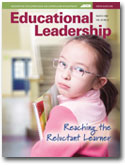September 2008
The Positive Classroom
Both new and experienced teachers cite classroom management as a major concern. This issue will explore the role of safe, orderly, engaging classrooms in producing high student achievement. How can we create a harmonious learning environment for students with different backgrounds and ways of learning? How can we best support students with disruptive emotional and behavioral issues? How can schools enlist students, families, and the community to participate in creating positive classrooms in which all students experience meaningful learning?
Deadline: April 1, 2008
October 2008
Expecting Excellence
As U.S. schools respond to pressure to get all students to "proficiency," educators worldwide are equally concerned about enabling individual students to reach their highest potential. This issue will look at school programs and practices that go beyond proficiency to foster excellence. Articles will ask, What does excellence in education mean? How can we measure it? How do schools differ in their approaches to excellence? How do content standards, ability grouping, and intensified course requirements promote—or discourage—high achievement for all? How are schools challenging their most able students?
Deadline: May 1, 2008
November 2008
Giving Students Ownership of Learning
Successful learners today are not just recipients of knowledge—they are active thinkers who know how to obtain knowledge and know what to do with it. Schools can cultivate such learners by giving students responsibility for their own learning. What role should students have in shaping curriculum, setting standards and learning goals, and designing the format of classes? What active role can they play in school reform? In shaping their own assessments? How can schools give students more say in what and how they learn while still meeting mandated curriculum and testing requirements?
Deadline: June 2, 2008
December 2008/January 2009
Data: Now What?
Test scores, dropout rates, attendance numbers, opinion survey data, gap analysis, demographic statistics, performance growth—educators have access to great amounts of data. But are we learning how to use data effectively? How are schools using data to identify and communicate areas of need? To establish accountability? To identify underlying causes of students' learning problems? To improve instruction? To make positive change?
Deadline: July 1, 2008
February 2009
How Teachers Learn
How do adults learn? From sharing knowledge and improving practice in teacher learning communities, to getting the most from professional development, to engaging in action research, to learning new technologies, how can teachers keep up with best practices and continue to grow as professionals? How can they deepen their content knowledge in the disciplines and reflect on their practice? What orientation, retention, and evaluation approaches promote teacher learning?
Deadline: September 2, 2008
March 2009
Literacy 2.0
Students are more plugged into technology than they have ever been before—through smartphones, iPods, laptops, social networks, and electronic games. This issue will explore the role of literacy in our ever-evolving digital environment. How can we help students learn and transfer traditional literacy skills? What new literacy skills are called for—and how can teachers and students guide one another in acquiring these key skills? How can we teach students to judge the reliability, accuracy, and quality of information? Articles will explore how wikis, blogs, RSS feeds, and portals of streaming media have affected how students read, write, speak, think, and work.
Deadline: October 1, 2008
April 2009
Supporting English Language Learners
The population of English language learners (ELLs) continues to grow, and educators face the challenge of effectively meeting the needs of these students and closing achievement gaps. Articles will discuss the learning needs of this heterogeneous population, which ranges from long-time residents who have been learning English for several years to recent arrivals with limited prior schooling. This issue will define practices and strategies across the curriculum that have proven effective with ELLs, including ways to connect to students' families and cultures.
Deadline: November 3, 2008
May 2009
Teaching Social Responsibility
The many challenges the world faces in the 21st century—such as global warming, social inequity, world conflict, and technological innovation—demand that schools prepare students to participate as informed, productive members of society. How can we prepare students to be responsible citizens and wisely use the freedoms that their society offers? This issue will also explore programs that teach ethics and social responsibility, prepare students for active participation in the democratic process, and encourage development of character.
Deadline: December 1, 2008
